Have you ever wondered which animals have a taste for pineapple?
Picture this: a group of curious monkeys swinging through the trees, each holding a juicy slice of pineapple in their hands.
Now imagine a family of raccoons sneaking into a pineapple field at night, their sharp claws effortlessly plucking the ripe fruit from the plants.
Fascinating, isn’t it? But these are just the beginning of the incredible stories we have in store for you.
As we explore the world of animals and their love affair with pineapples, you’ll discover a myriad of creatures, big and small, that can’t resist the sweet allure of this tropical delight.
So, get ready to uncover the secrets of parrots, raccoons, and many more as we delve into the intriguing world of what animals eat pineapple!
Parrots and Pineapples
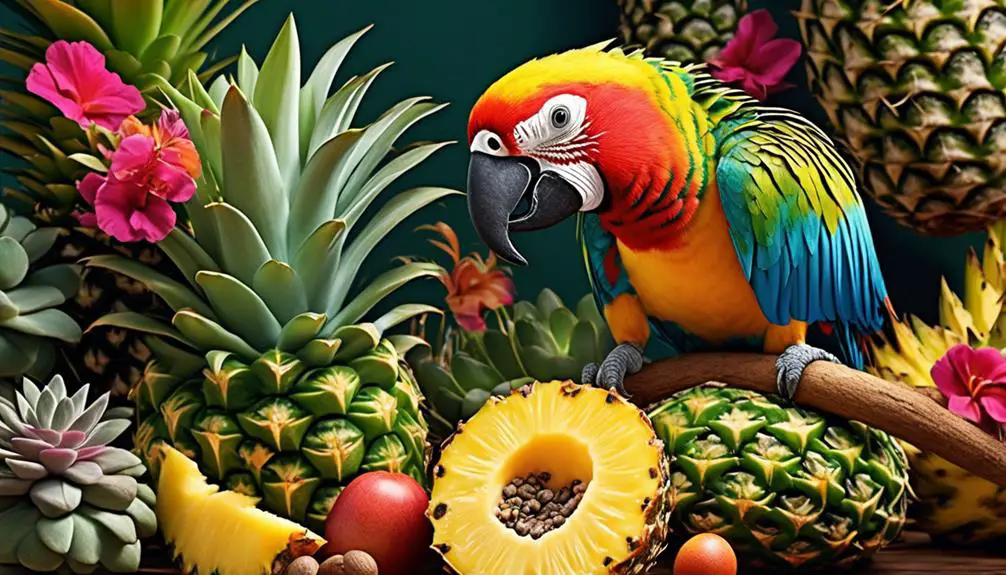
Parrots are known to have a strong affinity for pineapples, incorporating them into their daily diets due to the essential minerals and nutritional benefits they provide. Parrots, especially those on seed and plant-based diets, can be given pineapples to ensure their overall well-being. Farmers often take measures to protect their pineapple harvest from bird attacks, as parrots love to eat these tropical fruits. Pineapples contain essential minerals that aid in the absorption of vitamins and proteins in parrots, helping them stay strong and healthy.
The sweet and fragrant aroma of pineapples also attracts other animals, such as raccoons. These scavengers, with their strong sense of smell, are easily drawn to fresh pineapples and can even remove them from plants. To prevent raccoon intrusion, farmers often use fencing to protect their pineapple plantations. Similarly, rats are attracted to the sweet smell of pineapples and can easily bite through the hard outer skin to reach the fruit. The spikes in the leaves don’t deter rats from reaching this delectable treat.
Pigs, on the other hand, eat pineapples to improve their digestive health and build a strong immune system. Pineapples contain minerals and proteins that contribute to the development of strong bones and muscles in pigs. Additionally, these tropical fruits help pigs fend off diseases and increase their food consumption, making them extremely palatable to these animals. Feeding pigs a healthy amount of pineapples can also improve the quality of their meat.
To conclude, parrots, raccoons, rats, and pigs are among the animals that show an interest in consuming pineapples. Each species benefits from the nutritional value and minerals found in these tropical fruits, contributing to their overall health and well-being.
Raccoons and Pineapples
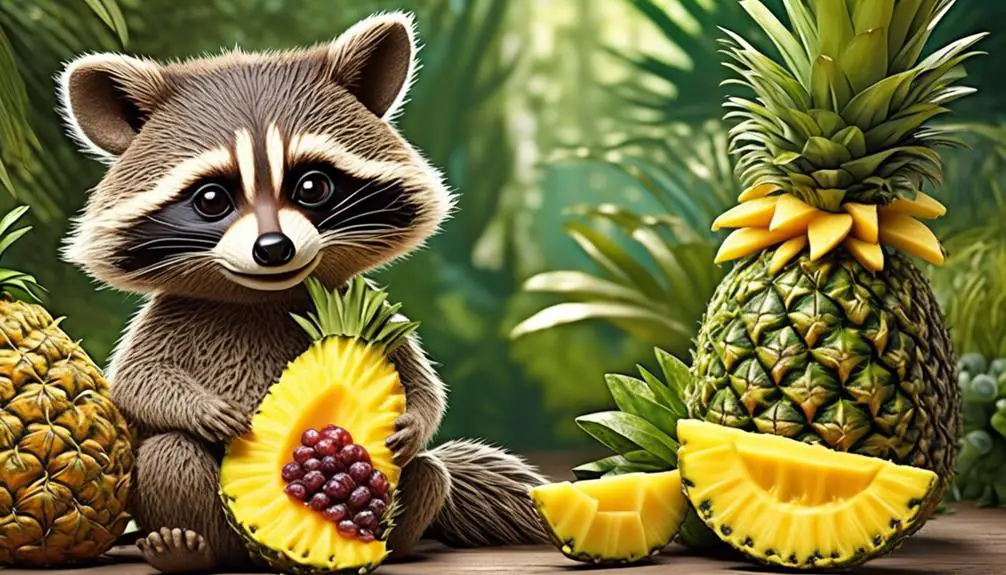
Raccoons, with their strong sense of smell and ability to easily remove fresh pineapples from plants, are highly attracted to these tropical fruits. Their scavenging nature and sharp sense of smell make them adept at finding and consuming a variety of food sources, including pineapples. Raccoons are known to be attracted to the strong scent of pineapples, which makes them a common sight in garbage dumps where discarded pineapples can be found.
In pineapple plantations, farmers often use fencing to keep raccoons out and protect their harvest. However, raccoons have been known to find ways around these barriers, using their dexterous paws to access the fruit. Once they’ve obtained a fresh pineapple, they can easily remove the outer skin and consume the sweet and juicy flesh inside.
It is interesting to note that pineapples aren’t a common fruit in the wild, making them a sought-after treat for raccoons. The rarity of pineapples in their natural environment may contribute to their attraction towards these fruits.
Rats and Pineapples
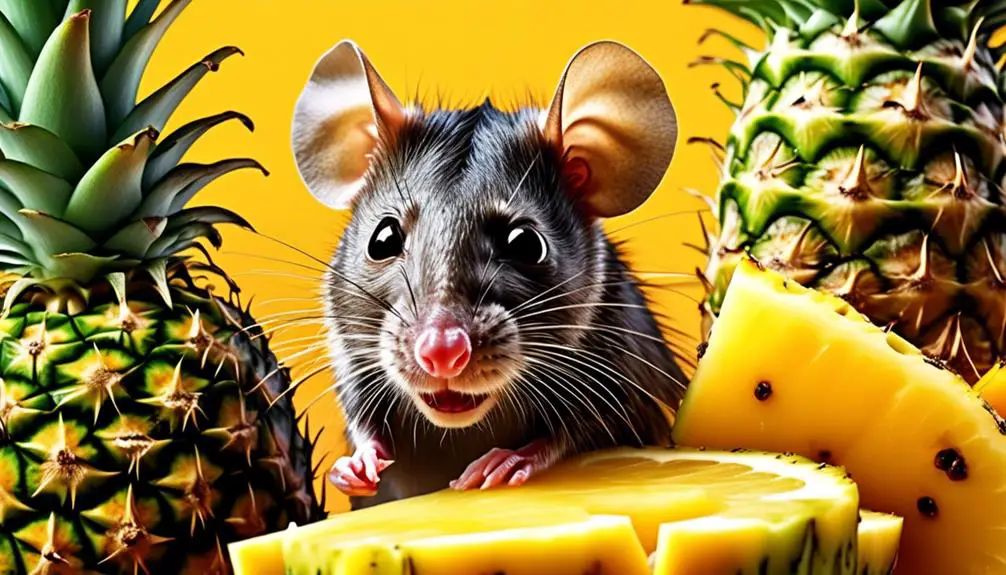
Rats are highly attracted to the sweet smell of pineapples and can easily bite through the hard outer skin to access the juicy fruit inside. Despite the spikes in the leaves, rats aren’t deterred from reaching the fruit. Pineapples, although not a common find in the wild, take months to ripen and develop their characteristic aroma, making them a favorite treat for rats.
Rats have sharp incisors that allow them to gnaw through tough materials, including the tough exterior of a pineapple. Their strong teeth enable them to penetrate the outer skin, exposing the succulent flesh within. This ability to pierce the pineapple’s outer layer is facilitated by their front incisors, which continuously grow throughout their lives.
Once rats gain access to the fruit, they can consume the pineapple flesh, which provides them with a source of hydration, as pineapples have a high water content. Additionally, rats can benefit from the nutritional value of pineapples, as they contain essential vitamins, minerals, and antioxidants. However, it’s important to control the amount of pineapple given to pet rats due to their high sugar content, which can lead to health issues if consumed excessively.
Pigs and Pineapples
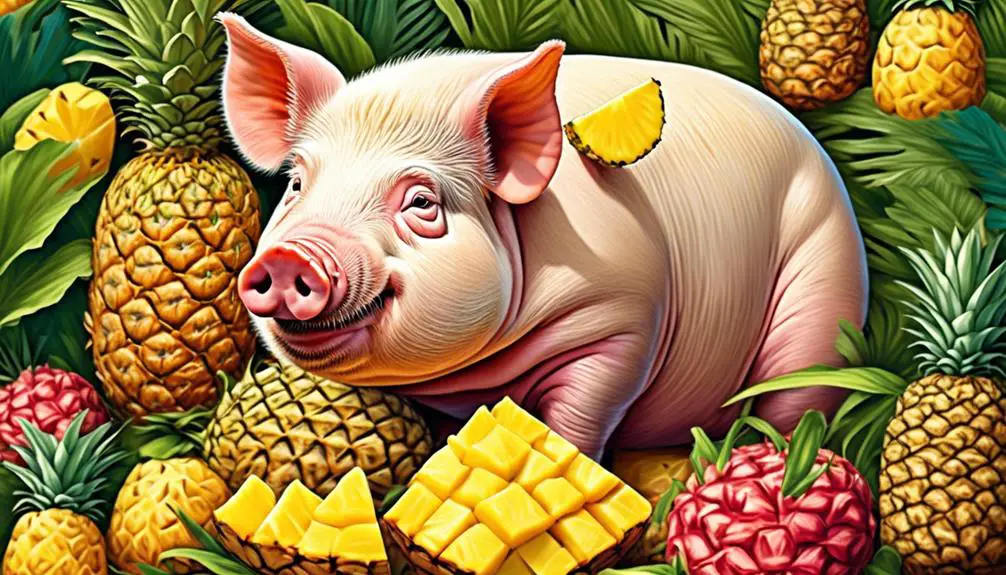
Pigs have a strong affinity for pineapples, as they consume them to improve their digestive health and build a robust immune system. Pineapples provide pigs with essential minerals and proteins that contribute to strong bones and muscles. Additionally, the consumption of pineapples helps pigs fend off diseases and increases their food consumption.
To further illustrate the significance of pineapples in a pig’s diet, the following table provides a comparison of the nutritional benefits of pineapples for pigs compared to other animals:
| Animal | Nutritional Benefits of Pineapples |
|---|---|
| Pigs | Improve digestive health and build a strong immune system. Pineapples contain minerals and proteins for strong bones and muscles. Help pigs fend off diseases and increase food consumption. Extremely palatable. Feeding pigs a healthy amount of pineapples can improve meat quality. |
| Parrots | Essential minerals aid in the absorption of vitamins and proteins. Help parrots stay strong and healthy. Can be included in their daily diet. |
| Raccoons | Attracted to fresh pineapples. Pineapples are a rare fruit in the wild, making them a favorite for raccoons. |
| Rats | Attracted to the sweet smell of pineapples. Can easily bite through the hard outer skin. Pineapples are hard to find in the wild, taking months to ripen. Controlling pineapple intake is important due to high sugar content. |
Squirrels and Pineapples
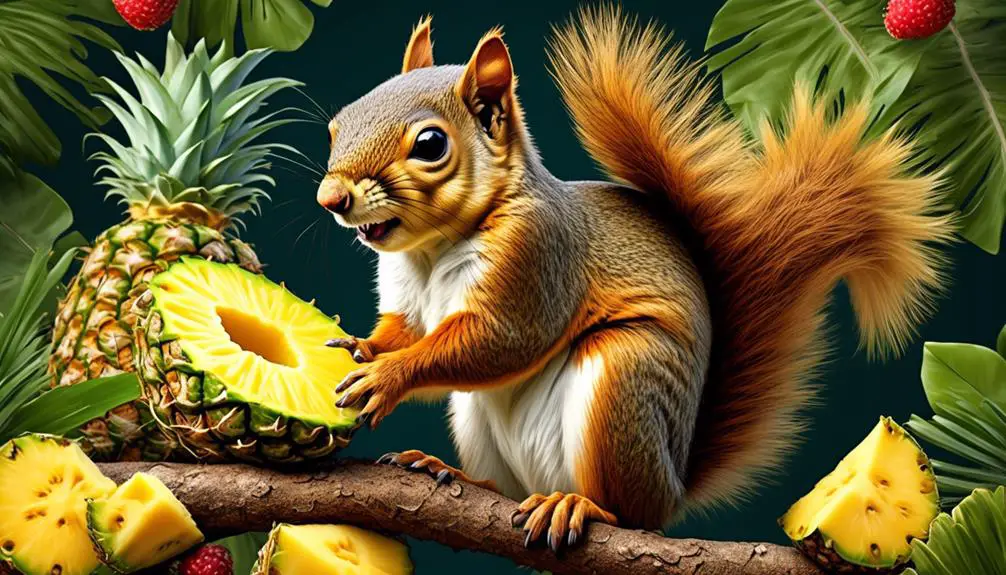
Squirrels, like many other animals, are attracted to the sweetness of ripe fruits, including pineapples. With their sharp teeth, squirrels can easily tear through the leathery outer skin of a pineapple to access the juicy fruit inside.
Pineapples provide squirrels with important minerals, antioxidants, and vitamins that contribute to their overall health and well-being.
Squirrel Diet Preferences
Squirrels exhibit a preference for a diverse range of fruits in their diet, including pineapples, due to their rich mineral, antioxidant, and vitamin content. Pineapples provide squirrels with essential nutrients that contribute to their overall health and well-being. To better understand the dietary preferences of squirrels, let’s take a closer look at their food choices:
| Fruits | Nuts | Seeds |
|---|---|---|
| Apples | Acorns | Sunflower |
| Berries | Walnuts | Pumpkin |
| Grapes | Almonds | Sesame |
Squirrels are known to forage for food and have a keen sense of smell that helps them locate ripe fruits, including pineapples. With their sharp teeth, squirrels can easily tear through the leathery outer skin of a pineapple to access the juicy fruit inside. It is important to note that fresh pineapples are recommended for pet squirrels, as canned ones often have high sugar content. Farmers often take measures to protect their pineapple harvest from squirrel attacks, recognizing the squirrels’ affinity for this tropical fruit.
Squirrel Pineapple Consumption
When it comes to consuming pineapples, squirrels demonstrate a notable preference for this tropical fruit due to its rich mineral, antioxidant, and vitamin content. Squirrels are attracted to ripe fruits, including pineapples, and they can easily tear the leathery outer skin of a pineapple with their sharp teeth.
Pineapples are rich in minerals, antioxidants, and vitamins that are beneficial for squirrels. Fresh pineapples are recommended for pet squirrels, as canned ones often have high sugar content.
Farmers need to protect their pineapple harvest from squirrel attacks, as squirrels can cause damage to the crops.
Monkeys and Pineapples
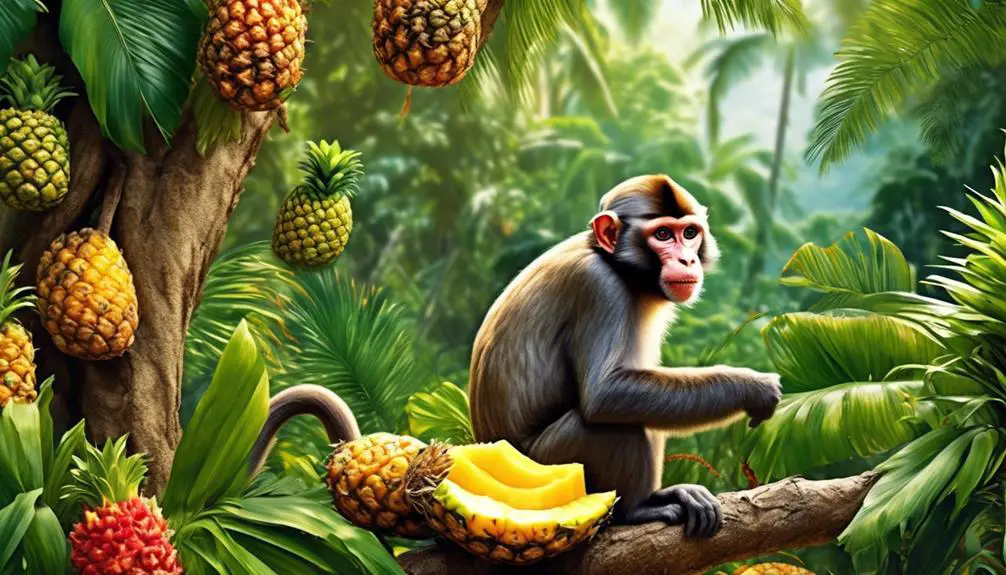
Monkeys, being herbivores, have a natural affinity for pineapples as part of their plant-based diet. They possess the ability to break open the top of a pineapple to access the fruit inside, undeterred by the spiky skin.
Pineapples, rich in antioxidants, provide essential nutrients that aid in building the immune system of monkeys.
Monkey Diet and Pineapples
Pineapples, with their rich nutritional profile and enticing sweetness, are an essential component of the herbivorous monkey’s diet. Monkeys are known to enjoy a plant-based diet, and pineapples are one of their preferred fruits. Despite the spiky skin, monkeys have the ability to break open the top of a pineapple and extract the delicious fruit inside. The high antioxidant content of pineapples helps build the immune system of monkeys, promoting their overall health. In captivity, pineapples are often included in the diet of monkeys to ensure they receive a well-rounded and nutritious meal. Below is a table summarizing the key aspects of the monkey diet and their affinity for pineapples:
| Monkey Diet and Pineapples | |
|---|---|
| Diet | Herbivorous |
| Preference | Plant-based |
| Feeding Behavior | Break open pineapple tops |
| Benefits | Rich in antioxidants for immune system |
| Captivity Diet | Includes pineapples |
Monkeys and Pineapple Consumption
The consumption of pineapples by monkeys is a notable aspect of their dietary habits and nutritional intake. Monkeys, being herbivores, have a preference for a plant-based diet that includes fruits, and pineapples are no exception. They’ve developed unique ways to access the fruit inside the spiky skin.
Monkeys are able to break open the top of a pineapple to extract the juicy fruit, undeterred by the protective spikes. Pineapples provide monkeys with essential nutrients such as antioxidants, which contribute to the building of their immune system. These fruits are also included in the diet of monkeys bred in captivity, ensuring they receive a well-rounded nutritional intake.
The consumption of pineapples by monkeys showcases their adaptability and ability to access nutritious food sources in their environment.
Benefits of Pineapples for Monkeys
Moving on from the discussion about monkeys and their consumption of pineapples, it’s essential to explore the numerous benefits that pineapples offer to these herbivorous creatures.
Monkeys, being herbivores, thrive on a plant-based diet that includes pineapples. They’ve the ability to break open the top of a pineapple and extract the fruit inside, undeterred by its spiky skin.
Pineapples are rich in antioxidants, which help build the immune system of monkeys, keeping them healthy and strong. These tropical fruits are also included in the diet of monkeys bred in captivity, ensuring that they receive the necessary nutrients.
With their sweet taste and nutritional value, pineapples play a vital role in providing essential elements for the well-being of monkeys.
Opossums and Pineapples
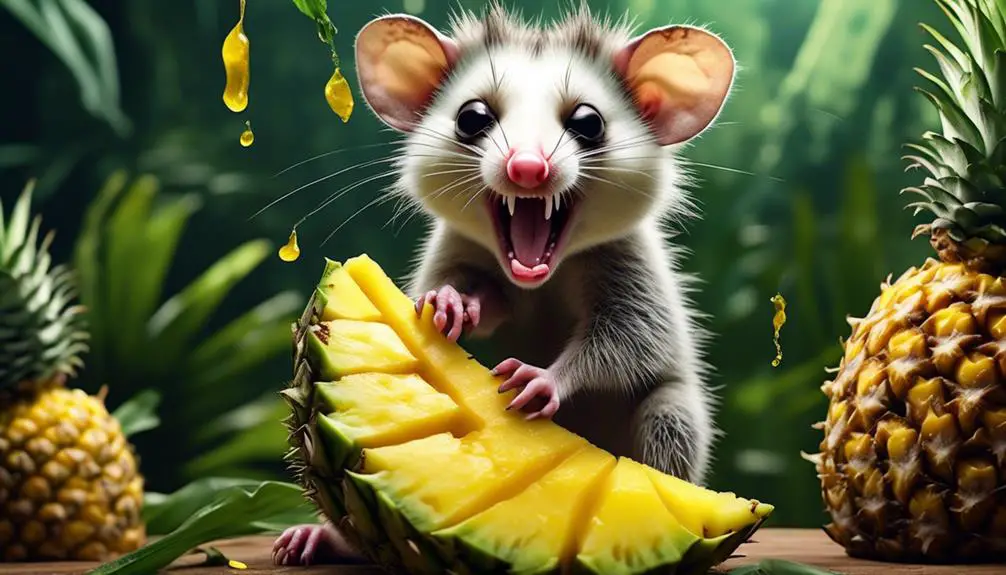
Opossums occasionally consume pineapples as part of their varied diet, although it isn’t a primary food source for them. Opossums, being marsupials, have a diverse palate and are known to eat a wide range of foods. While they may come across pineapples in their habitat, they don’t rely heavily on them as a significant food source.
Opossums have a unique feeding behavior, as they’re opportunistic omnivores. They’re known to scavenge for food and aren’t picky eaters. Their diet consists of fruits, vegetables, insects, small mammals, birds, eggs, and even carrion. They’ve adapted to their environment and are capable of consuming a variety of food items.
When it comes to pineapples, opossums may consume them if they’re readily available, such as in gardens or orchards. However, their consumption of pineapples is infrequent and incidental. Opossums are more likely to be attracted to other food sources, such as slugs and snails, which they play a beneficial role in controlling.
Deer and Other Animals

While opossums occasionally consume pineapples as part of their varied diet, let’s now explore the eating habits of deer and other animals when it comes to this tropical fruit.
Deer, although not regular consumers of pineapples, may occasionally indulge in this sweet treat if the outer spiky layer is broken open. Other animals that have been observed consuming pineapples include bearded dragons, rabbits, sugar gliders, ants, chickens, and guinea pigs. The sweetness of pineapples attracts a wide range of creatures, making it an enticing option for them.
In some cases, compost heaps may attract deer looking for food scraps, including pineapple leftovers. However, it’s important to note that pineapples aren’t a staple in the diet of deer or these other animals. Their consumption of pineapples is more sporadic and opportunistic.
Further research is needed to fully understand the nutritional benefits, if any, that pineapples provide to these animals.
Miscellaneous Animals and Pineapples

Various animals have been observed consuming pineapples, including those not previously mentioned. While some animals may only eat pineapples occasionally or as a supplement to their diet, others may actively seek out and consume this tropical fruit. Here are some miscellaneous animals that have been known to eat pineapples:
| Animals | Observations |
|---|---|
| Bats | Bats have been observed feeding on the nectar of pineapple flowers. They play a crucial role in pollinating pineapple plants. |
| Elephants | Elephants have been known to eat pineapples in the wild. The tough skin and spiky leaves do not deter them from enjoying the sweet flesh inside. |
| Lemurs | Lemurs, native to Madagascar, have been seen consuming pineapples as part of their diet. They are arboreal primates that rely on fruits for their nutrition. |
| Wallabies | In some regions, wallabies have been observed feeding on ripe pineapples. These marsupials have a varied diet that includes fruits, grasses, and leaves. |
| Skunks | Skunks have been known to scavenge for scraps in garbage dumps, and if pineapples are present, they may consume them. Their opportunistic nature leads them to explore various food sources. |
It is important to note that while these animals may consume pineapples, it does not necessarily mean that pineapples make up a significant portion of their diet. Pineapples may simply be a part of their occasional or opportunistic feeding habits.

Erzsebet Frey (Eli Frey) is an ecologist and online entrepreneur with a Master of Science in Ecology from the University of Belgrade. Originally from Serbia, she has lived in Sri Lanka since 2017. Eli has worked internationally in countries like Oman, Brazil, Germany, and Sri Lanka. In 2018, she expanded into SEO and blogging, completing courses from UC Davis and Edinburgh. Eli has founded multiple websites focused on biology, ecology, environmental science, sustainable and simple living, and outdoor activities. She enjoys creating nature and simple living videos on YouTube and participates in speleology, diving, and hiking.
🌿 Explore the Wild Side!
Discover eBooks, guides, templates and stylish wildlife-themed T-shirts, notebooks, scrunchies, bandanas, and tote bags. Perfect for nature lovers and wildlife enthusiasts!
Visit My Shop →